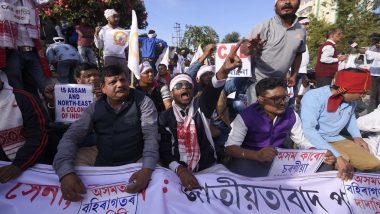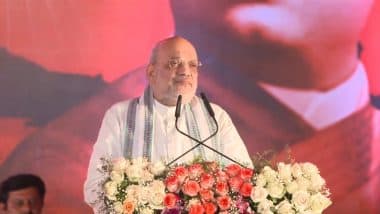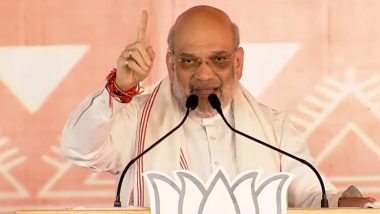New Delhi, December 10: The controversial Citizenship (Amendment) Bill 2019, which was passed by Lok Sabha on Tuesday, has triggered a nation-wide debate over whether the proposed legislation violates Article 14 and 15 of the Indian Constitution and discriminates against Muslims. Union Home Minister Amit Shah and several Bharatiya Janata Party (BJP) lawmakers spokes at length in the lower house of Parliament arguing that the Citizenship (Amendment) Bill is not biased and seeks to provide Indian citizenship to persecuted religious minorities coming from Pakistan, Bangladesh and Afghanistan. 'Savarkar Laid Foundation of Two Nation Theory': Congress Hits Back at Amit Shah Amid Debate Over Citizenship Amendment Bill.
What Citizenship Amendment Bill 2019 Says
The Citizenship (Amendment) Bill, 2019, seeks to provide Indian nationality to Hindus, Christians, Sikhs, Parsis, Jains and Buddhists fleeing persecution in Pakistan, Afghanistan and Bangladesh. As per the Bill, those illegal migrants who have entered India up to the cut-off date of December 31, 2014, to seek shelter, and continued to stay without proper documentation, will be eligible for Indian citizenship. The legislation is criticised for leaving out Muslims sects such as Shia, Ahmadi and Balochs, Tamilian from Sri Lanka and other religious minorities facing persecution in neighbouring countries. Citizenship Amendment Bill Debate: Manipur to be Exempted Via Inner Line Permit, Says Amit Shah; Here's How ILP Will Offset CAB Impact.
Article 14 and Article 15:
Article 14 of the Constitution talks about equality as a fundamental right. It other words all Indian citizens irrespective of their faith are equal before the law and have the protection provided by the law. Article 14 states: "The State shall not deny to any person equality before the law or the equal protection of the laws within the territory of India prohibition of discrimination on grounds of religion, race, caste, sex or place of birth."
Article 15 prohibits the government from enacting laws that are discriminatory in nature. Article 15 (1) and (2) proscribe the nation from discriminating any citizen on the basis of any one or many of the aspects such as religion, race, caste, sex, place of birth and others.
Citizenship Amendment Bill Violates Article 14 and 15, Say Opposition
Terming the CAB "unconstitutional", Congress MP Shashi Tharoor said that the legislation targets Muslims. He said that the Bill was an assault on the fundamental rights of the people of the country as religion was the determinant of the legislation. He said that this is also a violation of Article 14 of the Constitution which says that all persons in India shall be entitled to equal treatment. "The Parliament cannot deny them equal treatment. The Parliament does not have the legislative competence to bring in a bill which is so violative of the basic principles on which our Republic is founded," Tharoor added.
All India Majlis-e-Ittehad-ul-Muslimeen (AIMIM) lawmaker and a prominent Muslim voice in the country, Asaduddin Owaisi said that the Citizenship Amendment Bill is "arbitrary in nature" and "against the Muslim community". "Secularism is the basic structure of the Constitution and the Bill was arbitrary in nature and was in violation of fundamental rights," Owaisi said and tore a copy of the draft legislation in the Lok Sabha. Citizenship Amendment Bill Debate: Asaduddin Owaisi Stokes Row, Says 'Amit Shah's Name Will be Featured With Adolf Hitler, David Ben Gurion If...'
DMK MP Dayanidhi Maran alleged that the Bill is granting citizenship on the basis of their religion which is a violation of Constitution. "Probably the fear of the West, the fear of being isolated by West has crept into you and you had to include Christians in this bill," Maran said and asked: "What about if Muslims from the PoK want to come? What law do you have for that?"
Arguments in Favour of the Citizenship Amendment Bill
Union Home Minister Amit Shah rejected Opposition's charge that the Bill is "fundamentally unconstitutional" and in "violation" of Article 14 of the Constitution. "I assure that the Bill does not violate any article of the Constitution and that no citizen will be deprived of one's rights," he said. He dismissed the argument that Muslims sects such as Shia and Ahmadi are minorities in Pakistan, Bangladesh and Afghanistan.
"The Bill is for those minorities who faced religious persecution in Pakistan, Afghanistan and Bangladesh," Shah said. Referring to the Nehru-Liaquat Ali Khan agreement signed in 1950 after the partition of India and Pakistan, Shah said it was agreed to protect the rights of minorities, but only India followed it.
Defence Minister Rajnath Singh welcomed the CAB and said that Muslims are not oppressed in Pakistan, Bangladesh and Afghanistan, hence, cannot be given citizenship. "The three countries are Islamic states and the followers of Islam cannot be persecuted from the countries on the basis of religion," he said. Singh added only those who were persecuted on the basis of religion from the three countries would be given citizenship.
(The above story first appeared on LatestLY on Dec 10, 2019 04:17 PM IST. For more news and updates on politics, world, sports, entertainment and lifestyle, log on to our website latestly.com).













 Quickly
Quickly



















